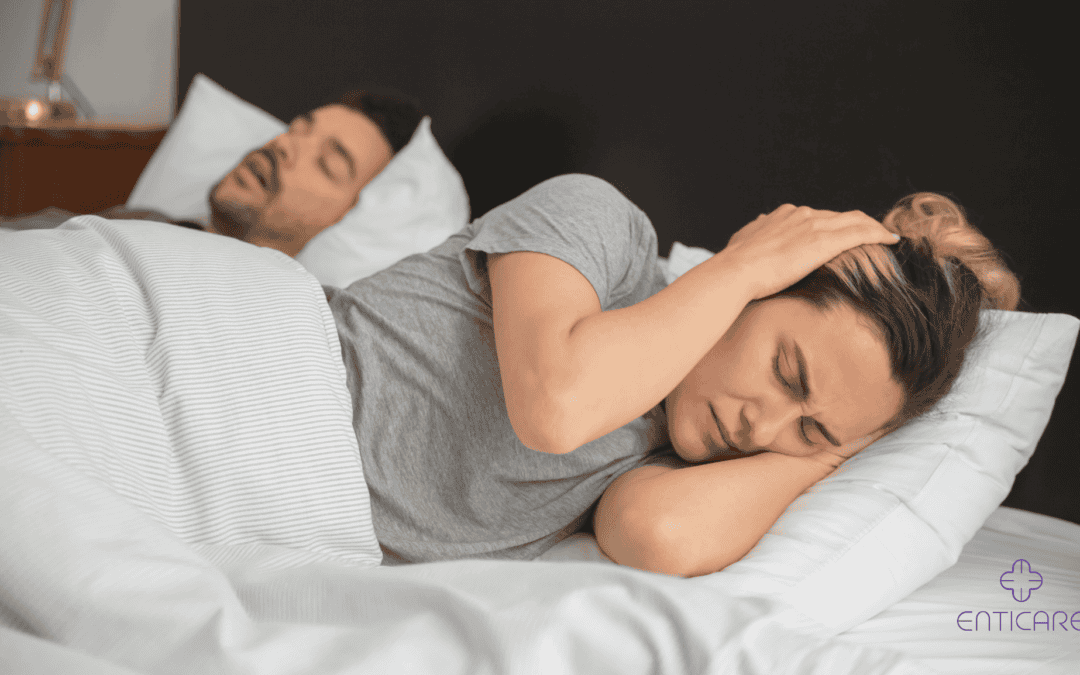If you’ve ever been kept awake by your partner’s snoring, you know just how frustrating it can be. Snoring doesn’t just affect sleep quality—it can also strain relationships, cause sleep deprivation, and lead to more serious health issues. But the good news is, you don’t have to suffer in silence! There are plenty of solutions to help your partner stop snoring and bring peaceful nights back into your life. In this blog post, we’ll explore what causes snoring, how to identify the underlying problems, and, most importantly, effective solutions to restore harmony to your nights and ensure a good night’s sleep.

Understanding Snoring
Snoring is a common phenomenon that affects millions of people worldwide. It is characterized by the vibration of the soft tissues in the throat, which can cause a loud, harsh sound. Snoring can be caused by a variety of factors, including obstructive sleep apnea, a narrow airway, or a deviated septum. Understanding the causes of snoring is crucial in finding effective solutions to eliminate snoring and improve sleep quality.
Snoring can be classified into different types, including primary snoring, which is not associated with any underlying sleep disorder, and secondary snoring, which is caused by an underlying sleep disorder, such as sleep apnea. Snoring can also be caused by lifestyle factors such as obesity, smoking, and alcohol consumption.
Signs That Your Partner’s Snoring May Be a Health Concern
Snoring doesn’t always signal a health issue, but in some cases, it can indicate a more serious underlying problem, such as obstructive sleep apnea (OSA). Here’s how you can tell when snoring is more than just an annoyance:
Clinical sleep medicine plays a crucial role in diagnosing and treating snoring-related health issues.
- Frequent Pauses in Breathing
- If your partner’s snoring is interrupted by long pauses followed by gasps for air, it may indicate sleep apnea. This requires immediate medical evaluation, as untreated sleep apnea can increase the risk of heart disease, stroke, and other complications.
- Excessive Daytime Fatigue
- Persistent tiredness during the day, even after a full night’s sleep, could suggest that snoring is affecting the quality of sleep. This is often a sign that something more serious, like sleep apnea, is happening.
- Morning Headaches or Dry Mouth
- Waking up with headaches or a dry mouth can indicate snoring-related sleep disruption. These symptoms can be caused by decreased oxygen levels during sleep, which affects your brain and body’s function.

Effective Solutions for Snoring: Nasal Strips and More
Fortunately, there are various strategies you can implement to reduce or eliminate snoring. Whether your partner’s snoring is caused by lifestyle factors or a medical condition, here are proven solutions that can help. It’s important to work together when a partner snores, as addressing the issue collaboratively can improve both emotional and physical intimacy.
- Lifestyle Changes
- Weight Loss: Losing even a small amount of weight can decrease fat around the neck and reduce snoring. Encourage your partner to eat healthier and incorporate exercise into their daily routine. Reducing snoring can help the non-snoring partner fall asleep more easily.
- Sleep Position: People are more likely to snore when they sleep on their back. Encourage side sleeping by using body pillows or special pillows that promote this position.
- Avoid Alcohol Before Bed: Alcohol relaxes the muscles in the throat, increasing the likelihood of snoring. Avoiding alcohol in the evening can make a big difference.
- Nasal Strips and Devices
- Nasal Strips: These adhesive strips open up nasal passages, making breathing easier and reducing snoring. You can find them over-the-counter at most pharmacies.
- CPAP Machine: For people with sleep apnea, a Continuous Positive Airway Pressure (CPAP) machine keeps the airway open by providing a steady stream of air. This device is highly effective in treating sleep apnea and reducing snoring. Learn about CPAP machines here.
- Medical Treatments
- Surgery: In some cases, surgery to remove excess tissue from the throat, nose, or palate may be necessary. Procedures like Uvulopalatopharyngoplasty (UPPP) or nasal septoplasty can significantly reduce or eliminate snoring.
- Mandibular Advancement Devices (MADs): These devices push the lower jaw forward, keeping the airway open during sleep. Dentists can custom-make MADs for people with mild to moderate snoring issues.
Relationship Impact
Snoring doesn’t just disrupt sleep; it can also put a significant strain on relationships. When one partner snores loudly and frequently, the other often suffers from sleep deprivation, leading to irritability, moodiness, and decreased intimacy. According to a survey, 19% of partners of habitual, loud snorers feel the strain on their relationship, and 44% report feeling sleepy the next day. Women with partners who snore are three times more likely to experience insomnia compared to those who sleep with non-snorers.
The emotional toll of snoring can be profound. Sleep deprivation can lead to increased arguments, reduced patience, and a general sense of frustration. Over time, this can erode the emotional connection between partners. Addressing snoring is not just about improving sleep; it’s about preserving the health and happiness of your relationship. By taking steps to reduce or eliminate snoring, you can foster a more harmonious and loving partnership.
How to Approach Your Partner About Their Snoring
Discussing your partner’s snoring can be a sensitive topic, but open communication is crucial for finding a solution. Here are some tips to approach the conversation respectfully and constructively:
- Use “I” Statements
- Rather than blaming your partner for disturbing your sleep, focus on how it’s affecting you. For example, “I’ve been feeling really tired lately because I’m not getting enough sleep.”
- Express Concern for Their Health
- Emphasize that you’re worried about their well-being and want to help them find a solution, especially if you notice signs of sleep apnea. Show that you care about improving their health, not just your own sleep.
- Suggest Solutions Together
- Work as a team to explore potential solutions. Whether it’s trying a new sleep position or seeking medical advice, be supportive and patient as you work toward resolving the issue.

Regain Peaceful Sleep
You don’t have to let snoring disrupt your good night’s sleep or relationship any longer. By understanding the causes of snoring and taking action to address the issue, you and your partner can enjoy restful, uninterrupted nights. Whether the solution lies in lifestyle changes, medical devices, or professional treatment, there are options available to help both of you sleep better.
If snoring persists or you suspect sleep apnea, don’t wait—schedule an appointment with a sleep specialist today. At Enticare, we offer comprehensive evaluations and personalized treatments to help you and your partner sleep soundly again. Click the link to book your consultation now and take the first step toward better sleep.

